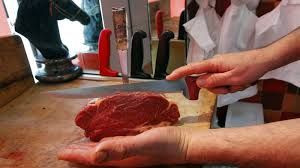Dutch Food Officials Recall 24,000 Pounds Of Horsemeat Sold As Beef

Officials from the Netherlands’ Economic Affairs Ministry have issued a recall of approximately 24,000 lbs. of French horsemeat that were mislabeled and sold as beef products. The horsemeat from French suppliers was considered unfit for human consumption and was accompanied by falsified documents claiming it was beef.
Dutch health officials made their decision following an investigation by the Food and Consumer Product Safety Authority (NVWA) that involved 200 dead horses. Twenty-one cattle traders, butchers, and veterinarians were arrested in France on suspicion of selling illegal horsemeat. Horsemeat falsely labelled as beef was delivered from Belgium to the Netherlands between January and October of last year.
Some of the horses used to produce the faux beef products were also used in the production of serums for rabies and other diseases by the French pharmaceutical company, Sanofi Pasteur. Unfortunately, at this time the NVWA has only been able to locate around 2,200 lbs. of horsemeat and fear the rest has already been consumed.
"We do not know [exactly] how much has been eaten or sold,” spokesman for the NVWA, Benno Bruggink told Reuters. "We expect that a reasonable amount has been eaten because we are talking about [a] period of over two years."
Following a notification from the European Union Commission Rapid Alert System for Food and Feed this past December, five companies have been contacted and asked to pull beef products off of their shelves. Health officials have started to recommend that all Dutch companies purchase meat from local cattle traders and butchers.
Back in April, the European Health Commission (EHC) announced that France is responsible for the highest number of reported horsemeat cases in all of Europe. Forty-seven meat products from France tested positive for horsemeat out of 352. The EU outlines a “comprehensive five point action plan” focusing on food fraud, testing program, horse passport, official controls and penalties, and origin labelling.
"Restoring the trust and confidence of European consumers and trading partners in our food chain following this fraudulent labeling scandal is now of vital importance for the European economy given that the food sector is the largest single economic sector in the EHC,” said Commissioner of European Health and Consumers Tonio Borg. "In the coming months, the Commission will propose to strengthen the controls along the food chain in line with lessons learned."
Published by Medicaldaily.com



























